With the year drawing to an end its time to look back on just how remarkable 2012 was for Shanghai Shenhua. ‘s Cameron, a Shenhua season ticket holder for the last seven years, tries to make sense of a baffling and bizarre 12 months at a club which became a household name in the football world with the purchase of Anelka and Drogba. Be sure to read the 2012 Shenhua player ratings along with this piece if you didn’t already catch them.
Good lord. How does one even begin to write this season review? It’s been a staggering year for Shenhua, mostly for the wrong reasons. This time 12 months ago, as raked over the ashes of Shenhua’s 2011 campaign, we described last season as a “bizarre and odd” one for the Hongkou club.
But Frankly, what happened this year makes last year look rather banal. The events which unfolded before our very eyes surpassed the imaginings of even the most wild fantasist. International superstars joining, player rebellions, Zhu Jun’s endless drama show, garbage truck-driving coaches, empty dugouts during matches – you name it, it happened at Hongkou this year. There’s no doubt that 2012 was the most remarkable season in the 19-year history of Shanghai Shenhua FC and it may prove to be one that shapes the club’s future direction for years to come.
Unprecedented anticipation
As with all classic tales of woe, things started on a high with the acquisition of Nicolas Anelka from EPL side Chelsea during the off-season. The signing was not only Shenhua’s biggest-ever capture, but also the CSL’s and his arrival would open the door to even bigger stars joining Chinese teams. But coming off the back of one of Shenhua’s worst-ever seasons in 2011, Le Sulk put a smile on a great many Shenhua fans’ faces when he joined last December on a two-year deal.
Then, with the ink barely dry on Anelka’s contract, Shenhua made another statement of intent by pinching one of their greatest rival’s best players, as Joel Griffiths found himself being mobbed by cheering fans at Pudong Airport after he left old foes Beijing Guoan to head south.
So with a big-name player who had scored goals with Chelsea, Liverpool and Arsenal in Anelka, and a proven CSL striker in Griffiths, Shenhua clearly meant business and the championship was talked of in certain quarters. Your correspondent wisely did not predict a third title for Shenhua in 2012, instead plumping for a prediction of second place, which in hindsight was almost as foolish. Nevertheless, optimism was in the air as the season started, a feeling further bolstered by the arrival of former Fulham coach Jean Tigana, who took the Hongkou hot seat in the close season.
The opening few fixtures of the 2012 campaign couldn’t have been tougher, with local derbies at home to Jiangsu Sainty and away to Hangzhou, a home clash to newly promoted Guangzhou R&F, an away trip to old foes Guoan, and a home clash against Evergrande. And tough it was – Shenhua’s only victory in that quintet of games came with a late goal in their match against R&F as 2012 got off to stuttering start.
With just 5 points out of a possible 15 on the board, murmurings of discontent started to emanate from inside Hongkou. The rumblings would be the prelude to one of the most bizarre series of events in Shenhua’s history.
Incredibly bizarre
The calamitous chapter began on April 11, when Jean Tigana’s entire backroom staff were shown the door, but the head coach himself remained. Confusion reigned as Tigana told the media he had received no indication from the club that his services were no longer required.
Speculation mounted as Shenhua fans once again found that most familiar of questions on their lips – what on earth was going on? Just two days later, fans were dumbfounded when Nicolas Anelka announced via his twitter that he had been made “Player/Coach” of the club. Did that mean coach as in training the players, or head coach, picking the team? No-one seemed to know, as conflicting signals emerged from Shenhua. The club said he wasn’t head coach, but Anelka himself suggested otherwise.
The farce continued when Tigana, apparently still in the job, turned up for a league game despite having to travel to Hongkou on his own that evening, separately from the rest of the squad. But oddly, he ended up hailing a cab on the street and leaving before the match even kicked off. Local media pictured (see main feature pic) a solitary member of Shenhua’s backroom staff, wearing a sheepish grin, as the only non-player on the home bench as the team lost to Tianjin in Shanghai for the first time ever. With Tigana having been made to walk the plank, the SS Shenhua sailed without a helmsman of any kind that night, in what was a very strange and puzzling evening for all concerned.
So Tigana was finally out, in something of a bizarre downfall. Things then began to become truly baffling. The entire footballing world couldn’t help but look on in bemusement when Nicolas Anelka formally took charge of team affairs, following his earlier tweet. Or was it informally? It was hard to tell, as the bizarity continued when Anelka brought in an old mate from his days in the French league, Jean-Florent Ikwange to act as stand-in head coach.
This was necessary as Anelka did not have the FIFA qualifications necessary to be head coach of a professional club. Ibenge, as former DR Congo coach, did however – it appeared to be the sole reason for his arrival in Shanghai. So in the space of a week or so Shenhua had gone from having a manager who had coached an English premier league side, to having one of the most notoriously anti-authority figures in modern football put in charge. The team then compounded this by officially putting Ibenge, a man so obscure he lacks a Wikipedia entry, in the hot seat. In reality, Ibenge’s role was to sign off team-sheets and lurk around trackside with his hands in his pockets, beside a bored-looking club interpreter.
This shambolic state of affairs couldn’t last long of course, and Anelka’s tenure saw Shenhua go a an abysmal four games in a row at home without scoring.
Anelka steps aside for Batista
The board soon realised what the rest of the universe knew long ago – Anelka was as much a football manager as Zhu Jun was a striker. After the weird Tigana-Anelka-Ibenge episode, the blue faithful looked forward to a more normal management arrangement. And on the face of it, Sergio Batista, who won Olympic gold as coach of Argentina, looked like a good appointment.
However, it wouldn’t be long before the Shenhua twilight zone struck again – Batista would become a familiar face in various Shanghai nightspots (hence the afternoon training sessions), whilst revealing his love of riding garbage trucks around the city. How bizarre indeed.
But the arrival of Batista did steady the Shenhua ship, which had been drifting rudderless on the high seas for quite some time. Anelka didn’t like it, but even he didn’t have the gall to think he deserved a longer shot at football management, and he stayed on. His habit of annoying people continued however, when, after a truly shocking Shenhua performance with a 1-0 defeat away to Qingdao, the man who was supposed to be captain got involved in a rumpus with a fan.
Drogba arrives
However, things did look up for Shenhua when, as had predicted, Didier Drogba signed for Shenhua in June. It would be a massive coup for any club, but for Shenhua, it was earth-shattering. “Shenhua’s nuclear bomb has arrived” proclaimed goalie Wang Dalei – and he was not wrong.
The summer transfer window also saw the ineffectual Mario Božić punted to make way for another big summer signing, Giovanni Moreno from Argentina’s Racing Club. Meanwhile, the shockingly incompetent Matthieu Manset finished his loan and returned to Reading.
Drogba wasn’t able to play right away however, but even before he made his debut his aura of awesome footballing power had already rubbed off on the side. Shenhua put in some of the best performances of the season around this time – contradicting the “Summer Syndrome” as the Shanghai media calls the team’s traditional poor July and August performances.
Spurred on by the sublime Moreno in midfield, only shocking refereeing prevented victory in Nanjing over high-flying Jiangsu Sainty in July. And then, hundreds of fans turned Pudong Airport’s arrival lounge into a madhouse as the great man Drogba finally touched down. In all his years as a football observer, your correspondent had never personally experienced anything like the incredible scenes which unfolded that day, 30km outside the city centre.
Later that night, with Drogba looking on from the stands, the Hongkou curse struck Beijing yet again as Shenhua beat old foes Guoan 3-1 in what was the highlight of the season. Then, three weeks later Drogba finally made his home debut, scoring a double as Shenhua smashed local derby rivals Hangzhou 5-1 in the best display of football seen at Hongkou in many a year. That evening, as the Blue Devils partied into the night, there could be few of a Shenhua persuasion who did not believe the club was about to go marching up the table and grab at least an ACL place. Drogba was here, Anelka was reactivated, the goals were flying in, the club had finally turned the corner
Or so we thought.
In actual fact, this handsome victory only served to alert CSL defences that Drogba had to be stopped at all costs. And with the team seemingly over-awed by his presence at times, and somewhat over-reliant on the Ivorian striker, this was a very effective tactic if you wanted to take something out of a Shenhua game.
Mediocrity returns
in late August, the Shanghai side went 180 minutes without scoring a goal in back-to-back games away to Tianjin, and then, criminally, at home to a very mediocre Dalian Shide team. The Drogba magic spell had already been broken, and from this point forward, Sergio Batista would fail to find a way to make the team function effectively, due to it being horribly unbalanced in almost every way imaginable, be it tactically, positionally, and ability-wise.
Shenhua struggled to get into any rhythm after Drogba arrived. Indeed, Drogba threw a wobbler after the team threw away a first-half lead against city rivals Shanghai Shenxin, frustrated at having the likes of heavy smoker Jiang Kun trying to back him up from midfield.
At this point in mid-September, it became clear that ACL qualification was beyond Shenhua. A shares equity dispute, which had broken out a month earlier, again thrusting Shenhua into the world footballing spotlight, then grew more serious. Rumours of players not getting paid on time grew, whilst Drogba and Anelka’s futures looked increasingly uncertain. An element of farce, which had never been away from Hongkou for long this season, then abruptly returned when Shenhua’s players went on strike for a day, protesting non-payment of wages.
The act, carefully stage-managed by Zhu Jun in an attempt to get other shareholders to budge in the equity dispute, ensured that odd goings-on were again the order of the day, local newspapers carried pictures of the squad strutting around in casual clothes, as Anelka and Wang Dalei played basketball, at the club’s Pudong training base.
As October drew in, Shenhua’s unbeaten 11-game run came to a sticky end away to Guizhou – the club’s first loss since Drogba’s arrival, a match which effectively left the club with nothing to play for 2012. A further defeat to Changchun at home meant relegation was arithmetically possible. But Shenhua ended a year of spectacular under achievement by only securing their CSL status on the second last day of the season with a 0-0 away to Dalian Aerbin. The year of strangeness ended on a relatively high note with a strong 3-0 win in the final match of the season against Qingdao.
Dog’s dinner
So where to begin the post-mortem? Let’s start by comparing this year’s final standing with last years:
2011 11th place – W11 D4 L15 F31 A41 Pts 37
2012 9th place W 8 D14 L8 F39 A34 Pts 38
The facts are laid bare for all to see. Despite Shenhua spending an exponentially higher amount of money this year on transfer fees and salaries, the club only gained one point more, and actually won fewer games, than last year. Draw your own conclusion.
Where did it all go wrong? For a start, Shenhua’s transfer policy was flawed right from the beginning, signing three foreign forwards in the shape of Griffiths, Mansett and Anelka. Griffiths, it was justified, could play wide right. But Shenhua already had a very capable right-winger there in the shape of Feng Renliang, who was in fact a more effective player in that position compared to the Aussie.
Mansett, as we have been over before many times on , was just utterly useless. It beggars belief that Shenhua paid Reading a cash sum to loan this guy. Whoever is responsible for scouting foreign players for Shenhua should be publicly flogged. He was so bad he made the Hongkou crowd laugh out loud at his failure to execute even basic football skills. It should be noted Chinese fans are normally very forgiving towards foreign players, but Mansett was just that bad. It would have been more sensible to hold onto young striker Dong Xuesheng, who scored 5 goals whilst on loan Shenzhen last season, as back up for Griffiths and Anelka, rather than donkey Mansett. Instead Dong left for Dalian Aerbin in the close season.
Griffiths missed much of the season due to injury, one of the few factors outside Shenhua’s control which contributed to their miserable season. His CSL know-how, after four seasons with Beijing, was much missed. But with Dong gone, Griffiths absence betrayed a lack of strength and depth in the local striking department. Foreign player slots are too valuable to waste three of them on striker role when most modern formations use two strikers at most. This top-heavy policy meant Shenhua’s midfield was put under too much pressure to create for Anelka, and then Drogba. The club clearly thought Jiang Kun and Yu Tao, the clubs most experienced first team regulars, would suffice.
But they got it wrong badly, Jiang is laughably unfit and shouldn’t be anywhere near a football pitch, whilst Yu Tao is a defensive-minded player who couldn’t do it all himself. It’s no co-incidence that the problems in midfield came to a head after Batista took over and started picking Jiang Kun in the first 11. Jean Tigana had very wisely refused to pick Jiang, going for the up-and-coming Zhang Kaimu instead. Perhaps refusing to play boardroom favourites was the reason for Tigana’s departure. We may never know.
Lights are on, but no-one home
But if the problem was correctly identified, the solution found wasn’t really the right one. Giovanni Moreno was brought in ostensibly in response to Anelka’s complaints that no-one was passing him killer balls. But video evidence shows Cao Yunding’s creative ability to be more than up to this task at CSL level. Unfortunately, the signing of attack-minded creative midfielder Moreno consigned the similarly styled Cao to the bench for most of the rest of the season. Moreno initially made a great impact, but he soon got complacent.
The end result was a dysfunctional midfield which, alongside a wasteful Moreno, featured Jiang Kun puffing his way around the pitch, way behind the action, alongside the diligent Yu Tao, who is a dedicated professional but perhaps a bit weak in the tackle to be the midfield enforcer Shenhua has been crying out for. Out on the wings were Feng Renliang who looked lost this season, and Song Boxuan on the left, who thinks he is better than he really is. It added up to a lack of chances coming from the middle of the park.
It’s no co-incidence that both Drogba and Anelka found themselves playing very deep in a lot of games this year, this suggests tactical failures on the part of Batista, and of Zhu Jun in buying the wrong players. These two factors combined to produce phenomenons such as Anelka in defensive midfield, Yu Tao in central defence, and other square pegs being hammered into round holes. All in all, Shenhua did not play to the strengths of the domestic players in the squad. The talents of Cao Yunding and Feng Renliang were badly under-utilized.
A dysfunctional club
It’s by looking off the pitch that the reason for Shenhua’s lop-sided transfer policy can be understood. Zhu Jun, whilst he professes to love football, is not a football man and this is reflected by his dealings in the transfer market. Anyone who manages to bring Drogba to a Chinese club clearly has superb business acumen. But that is all Zhu Jun has, he fails to understand the bigger picture beyond signing star players. They need a professional environment to work in, not to be used as pawns in boardroom politics, or to play alongside out-of-shape 34-year-olds with a nicotine habit. Shenhua professes to be a modern and professional club free from local government interference in terms of how it is run, but in reality, one type of interference from people who don’t understand football, has just been replaced by another in the form of Zhu Jun.
understands that one of the reasons Jean Tigana had to go was that he was “too French” and was too blunt in telling the club what needed to be done to run things properly. Shenhua might make noises about wanting to be as professional as possible, but when push came to shove, the old guanxi networks and system of patronage which are the hallmarks of organizations in China are not so easy to change. Not even if the agent pushing for change in a football institution is a man who coached in one of the world’s most respected leagues, Tigana. This is why Jiang Kun, a senior player clearly no longer fit for CSL duty, was not picked once as starter by Tigana. It’s also why Jiang Kun was one of Tigana’s most vocal critics during his departure. Jiang joined Shenhua when they merged with Zhu Jun’s Shanghai United in 2007, and he appears to be a Zhu favourite for that reason.
Batista, Tigana’s replacement, is certainly no Frenchman. hailing from Argentina, is infinitely more suited to dealing with clubs run by the whims of powerful and rich owners. Batista appears much more pliant and willing to go along with whatever decrees are handed down from above – hence, it’s no coincidence Jiang Kun became a regular pick under Batista.
It’s understandable that Zhu Jun thought his big-money signings would bring success to the club. Would any Shenhua fan have said signing Anelka and Drogba was a bad idea, at the start of the season? Without the benefit of hindsight, it would be absurd to think so. But the reality is that both of these players left a club which, although also owned by a domineering and egotistical figure had top-notch training facilities, management systems and playing staff. Coming to Shenhua, where the manager doesn’t start training sessions until the afternoon, would have been something of a shock for both. Drogba, who grew up in a developing country, was perhaps able to deal with the randomness and chaos of Shenhua bit better than Anelka, but even he looked weary and out of ideas by the end of the season. One wonders what Drogba really thinks about what goes on behind the scenes, it would surely make for an endlessly fascinating story.
Shanghai one circle
The club has now gone full circle. This time last year, not long before Anelka signed, doom and gloom was the order of the day as we pondered how Shenhua could challenge for honours with such a young and inexperienced squad. Then, Anelka’s arrival sparked something of a revolution, which reached its climax when Drogba pulled on a Shenhua jersey in the summer. Since then, results on the pitch just didn’t materialize, and with the shares equity dispute still unresolved, the club’s future again looks very uncertain.
Talk is of a plan A and plan B. The first plan see’s Zhu Jun gain his controlling stake on the club. If that happens, expect Drogba to stay, Anelka to leave but be replaced with another big name, and for Shenhua to be at least be in a position to try for the championship. But in the last week, the signs are that plan B is in effect. According to the Shanghai media, Zhu Jun will move the club to Wuxi in Jiangsu province if he doesn’t get his way in the dispute, by the end of this month, and jettison key domestic and international players. That seems unlikely, but it’s very unsettling for everyone connected with Shenhua and until the shares issue is resolved, its extremely difficult to make meaningful forecasts for next year.
All in all, 2012 just seemed like a weird dream. Did we wake up yet?

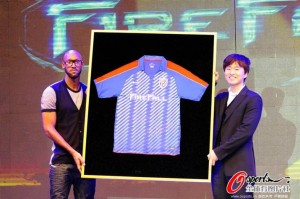
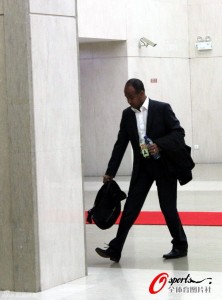
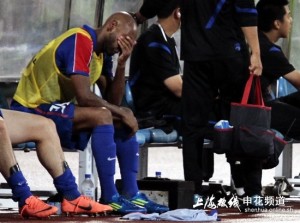
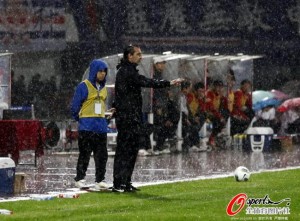
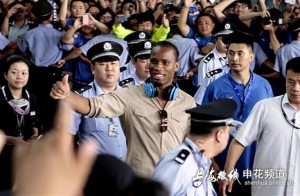
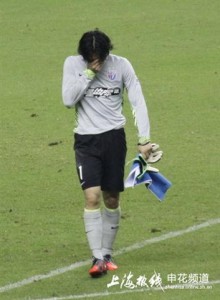
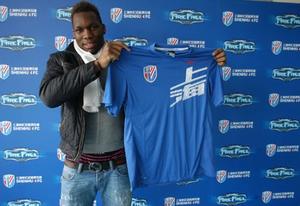
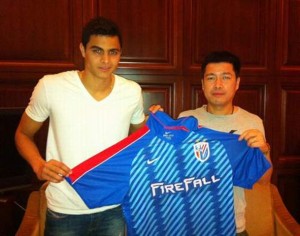
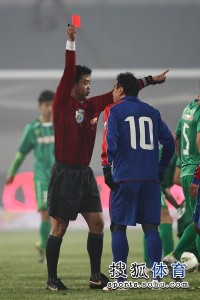
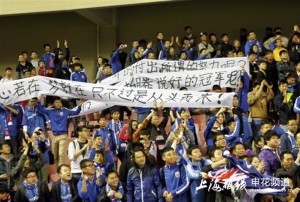
Sadly, there isn’t anything those of us of a Shenhua persuasion can disagree with here — farce, disappointment and a bleak short-term future.
While Jiang Kun makes a great (jumbo-sized) poster boy for the flaws of the set-up, I’d argue (predictably) that Anelka does the same.
In Drogba, we saw the benefits of signing a big-money superstar who still has the ability to cut it at the top level, and who respects the football club, league & culture and is willing to put a shift in.
Anelka represents the short-term PR of Zhu Jun — a big name, but one with no real benefit to the team, and whose lazy egotistic pandering only served to contribute to the downward spiral of 2012.
A strong 2013 for Shenhua is something we can only hope for, rather then expect at this point.